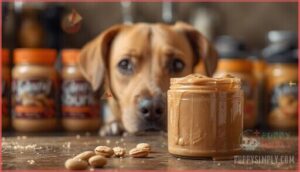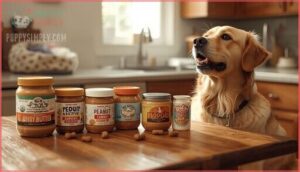This site is supported by our readers. We may earn a commission, at no cost to you, if you purchase through links.

The good news? Plain peanut butter without xylitol makes a safe, protein-packed reward that most dogs can enjoy. Before you let your pup lick that spoon, you need to know which ingredients protect your dog and which ones put them at risk.
Table Of Contents
- Key Takeaways
- Can Dogs Eat Peanut Butter Safely?
- Dangers of Xylitol in Peanut Butter
- Health Benefits of Peanut Butter for Dogs
- Risks and Side Effects of Peanut Butter
- How Much Peanut Butter Can Dogs Eat?
- Choosing Dog-Safe Peanut Butter Brands
- Safe Ways to Feed Peanut Butter to Dogs
- Peanut Butter Alternatives for Dogs
- Homemade Peanut Butter Recipes and Storage
- Frequently Asked Questions (FAQs)
- What are the benefits of feeding dogs peanut butter?
- How much peanut butter can a dog eat?
- Are there any risks associated with feeding dogs peanut butter?
- Is peanut butter safe for dogs?
- Can dogs have peanut butter with jelly?
- Is organic peanut butter better for dogs?
- Can dogs with pancreatitis eat peanut butter?
- Can dogs with food allergies eat peanut butter?
- Can dogs with diabetes eat peanut butter?
- Can puppies eat peanut butter safely?
- Conclusion
Key Takeaways
- Xylitol, a common sweetener in sugar-free peanut butter, causes life-threatening poisoning in dogs within 30-60 minutes, triggering rapid insulin release, hypoglycemia, and potential liver failure even in tiny amounts.
- Plain, xylitol-free peanut butter is safe for dogs in moderation, following the 10 percent rule where all treats combined shouldn’t exceed 10% of daily calories (roughly ½ teaspoon for small dogs, 1-2 teaspoons for medium dogs, and up to 1 tablespoon for large dogs).
- Peanut butter provides real nutritional benefits including 25% protein content, healthy fats for coat health, and essential vitamins B and E, making it an effective high-value training reward and enrichment tool when stuffed in treat toys.
- Beyond xylitol, watch for excessive sodium (over 400 mg per 100g), added sugars, hydrogenated oils, and high fat content (about 100 calories per tablespoon) that can trigger pancreatitis, obesity, and other health issues if overfed.
Can Dogs Eat Peanut Butter Safely?
Yes, dogs can eat peanut butter safely—but only if you choose the right kind and serve it in moderation. The main concern is xylitol, a sweetener that’s toxic to dogs, so checking labels is essential.
Let’s look at what makes peanut butter safe and how to use it as a healthy treat.
Overview of Peanut Butter for Dogs
Peanut butter is a beloved treat among dogs and their owners. Most peanut butter is safe for dogs when it’s free of xylitol and offered in small amounts. The American Kennel Club confirms that plain, xylitol-free peanut butter can be a healthy reward.
Here’s what makes it appealing:
- Rich protein source supporting muscle health
- Healthy fats promoting shiny coats
- Contains vitamins B and E for metabolism
- Works great in treat toys and training
- Helps hide medication when needed
Always check labels before sharing peanut butter with your dog. It’s vital to choose a peanut butter brand that’s xylitol free options to guarantee the dog’s safety.
The Role of Moderation in Treats
While peanut butter offers nutritional benefits, dog nutrition depends on caloric balance. Over 53% of dogs in the U.S. are overweight, often from excessive treat feeding. Apply the 10 percent rule: all dog treats combined—including peanut butter—shouldn’t exceed 10% of daily calories.
Treat portion control prevents obesity and pancreatitis. Use peanut butter as a reward system sparingly. Choose safe peanut butter brands without xylitol, and practice healthy snacking by breaking treats into smaller portions for better moderation.
It’s essential to check the peanut butter safety guidelines before sharing it with your dog.
Dangers of Xylitol in Peanut Butter
Xylitol is a sugar substitute that’s deadly to dogs, even in small amounts. If you’re giving your dog peanut butter, you need to know what xylitol is, how to spot poisoning, and which brands to steer clear of.
Let’s break down what makes this ingredient so dangerous and how to keep your pup safe.
What is Xylitol?
This artificial sweetener can turn a simple treat into a serious emergency. Xylitol is a five-carbon sugar substitute derived from plant sources like corn husks and birch wood.
While it’s safe for humans, even small amounts—over 100 mg per kilogram of body weight—trigger life-threatening xylitol toxicity in dogs. The chemical structure causes rapid insulin release in canines, creating xylitol poisoning in dogs within minutes.
While safe for humans, xylitol triggers life-threatening toxicity in dogs at doses over 100 mg per kilogram, causing rapid insulin release and poisoning within minutes
Always check labels for these toxic ingredients to verify dog food safety.
Symptoms of Xylitol Poisoning
Within 30 to 60 minutes of ingesting xylitol, dogs commonly develop hypoglycemia signs like vomiting, weakness, and stumbling. Seizure risks increase rapidly as blood sugar plummets below safe levels. Over 80% experience vomiting first, followed by tremors or disorientation.
Without emergency response, xylitol toxicity in dogs can progress to liver failure, coma, or death within hours. Watch for these symptoms of xylitol poisoning in dogs immediately after exposure.
Brands Containing Xylitol to Avoid
Several protein peanut butter brands contain xylitol, which poses serious toxicity risks to dogs. Brands such as Go Nuts Co., Krush Nutrition’s Nutty By Nature, Nuts ‘N More, P28 High Protein Peanut Spread, and Hank’s Protein Plus all list this toxic ingredient.
Always read labels carefully before choosing safe peanut butter for your dog. Xylitol awareness saves lives—stick to dog-safe options without artificial sweeteners.
Health Benefits of Peanut Butter for Dogs
When given in the right amounts, peanut butter offers real nutritional value for your dog. It’s not just a tasty distraction—it actually provides protein, healthy fats, and essential vitamins that support your pet’s overall health.
Let’s look at what makes this popular treat more than just a training bribe.
Protein and Healthy Fats
Your dog’s body thrives on nut butter as a protein source—peanut butter packs roughly 25% protein and bolsters muscle health through essential amino acids like lysine and leucine. The healthy fats, especially omega-6 fatty acids, boost fat metabolism and deliver energy density for active pups.
Here’s what natural ingredients offer:
- Two tablespoons provide 7 grams of protein for tissue repair
- Linoleic acid keeps skin hydrated and coats shiny
- Amino acids strengthen immune function and enzyme production
- Polyunsaturated fats reduce dry skin by 20% in trials
- Energy stability improves endurance performance up to 8%
Nutrient balance matters—moderation unlocks these benefits without excess calories.
Essential Vitamins and Nutrients
Beyond protein and healthy fats, peanut butter delivers a nutrient profile that bolsters dog health and nutrition through vitamins and mineral content. Vitamin E—about 1.92 to 3 mg per two-tablespoon serving—promotes healthy muscles, eyes, and skin while slowing degenerative eye conditions. B vitamins like niacin and biotin boost brain function and coat quality.
Magnesium and phosphorus strengthen bones, and fiber analysis shows roughly 1 gram per tablespoon aids digestion, making safe peanut butter brands valuable protein sources for healthy dog treats.
Supporting Dog Training and Enrichment
Peanut butter for dogs transforms from simple snack to powerful training tool, reinforcing behaviors through positive reinforcement techniques and high-value rewards. During dog training sessions, this motivating treat keeps dogs focused on commands and calms reactive behavior by occupying their mouth.
Stuffed into treat dispensers and toys, it delivers canine mental stimulation through enrichment activities—frozen Kong puzzles extend engagement while reducing anxiety and destructive habits.
Trainers use peanut butter rewards in counter-conditioning, making stressful situations like vet visits more manageable for your pet.
Risks and Side Effects of Peanut Butter
Peanut butter isn’t perfect for every dog. While it offers nutritional perks, there are some concerns you need to know about before making it a regular treat.
Let’s look at three potential downsides that could affect your dog’s health.
High Fat and Calorie Content
One tablespoon packs roughly 100 calories—up to 10% of what a small dog needs daily. That calorie intake adds up fast, especially since peanut butter delivers 52% fat content with an inflammatory omega-6 to omega-3 ratio of 438:1.
Excess calories and fat disrupt dietary balance, fueling dog obesity prevention challenges and raising pancreatitis risks. Weight management depends on controlling nutrient density, so limit portions to ½ teaspoon for small dogs, ensuring healthy fats don’t compromise overall dog health.
Salt and Additives Concerns
Hidden hazards lurk even in “natural” labels—sodium levels in some commercial brands can hit 3% per serving, pushing your dog toward kidney stress and high blood pressure. Always check for toxic ingredients like xylitol (sometimes listed as “birch sugar”), hydrogenated oils, and preservatives that disrupt nutrient balance and gut health.
Ingredients to avoid:
- Salt: Excessive sodium strains kidneys and elevates blood pressure risks
- Sugar substitutes: Xylitol and similar additives cause life-threatening toxicity
- Hydrogenated oils: Trans fats fuel inflammation and chronic disease
- Preservatives and dyes: Trigger digestive upset and allergic reactions without nutritional value
Choose unsalted, single-ingredient peanut butter to sidestep additive risks and protect your dog’s long-term health.
Peanut Butter Allergies in Dogs
Though rare, peanut reactions occur—fewer than 1% of dogs develop peanut butter allergies, but those who do face acute allergic reaction symptoms like itching, skin inflammation, vomiting, or ear infections.
Dogs with chronic food allergy signs or pre-existing sensitivities show three times higher dog hypersensitivity risk.
Canine testing through an 8–12 week elimination diet confirms allergen exposure triggers, helping you identify peanut reactions and protect your dog’s health.
How Much Peanut Butter Can Dogs Eat?
You know peanut butter is safe in moderation, but how much is too much? The right amount depends on your dog’s size and daily calorie needs.
Let’s break down the guidelines so you can treat your pup safely.
The 10 Percent Rule
When you’re adding peanut butter to your dog’s routine, think of treats as extras, not meal replacements. Feeding guidelines recommend that treat portions stay under 10% of your dog’s total daily calorie intake to maintain nutrient balance.
Since peanut butter packs around 90-100 calories per tablespoon, calorie control matters. This daily limit keeps your pup’s diet on track while avoiding risks like obesity or pancreatitis—and always check for xylitol before offering any peanut butter for dogs.
Serving Sizes by Dog Size
Your dog’s weight directly affects peanut butter serving sizes. Small dogs under 20 pounds can have ½ to 1 teaspoon per serving, while medium dogs (20-50 pounds) safely handle 1 to 2 teaspoons. Large dogs over 50 pounds may receive up to 1 tablespoon daily.
Divide portions into two smaller servings throughout the day for better portion control and digestive comfort, always staying within dog treat serving sizes guidelines.
Signs of Overfeeding
Watch for these warning signs that your dog has had too much peanut butter. Weight gain and obesity are common when portions aren’t controlled—you might notice a thicker waistline or ribs that are harder to feel.
Gastro issues like diarrhea, vomiting, or bloating signal digestive distress from high fat content.
Behavioral changes such as lethargy, increased thirst, or refusing regular meals indicate physical discomfort.
Emergency symptoms including severe abdominal pain or weakness could mean pancreatitis, requiring immediate veterinary care.
Choosing Dog-Safe Peanut Butter Brands
Not all peanut butter is created equal regarding your dog’s safety. The label matters more than you might think, and knowing what to look for can protect your pet from harmful ingredients.
Let’s break down what makes a peanut butter truly dog-safe and which brands pass the test.
Ingredient Checklist (What to Avoid)
Reading ingredient labels is like checking for red flags before trusting a new friend—you need to spot the dealbreakers. Xylitol is the most toxic ingredient to watch for; it may appear as birch sugar, wood sugar, or xylite on labels.
Avoid peanut butter with added sugar (some contain up to 7 g per serving), high sodium levels exceeding 400 mg per 100 g, hydrogenated oils, and synthetic preservatives like BHA or BHT.
Choose products listing only peanuts and minimal salt for true dog-safe peanut butter.
Recommended Brands for Dogs
When searching for dog-safe peanut butter brands, veterinarians consistently recommend 365 Everyday Value Organic Peanut Butter and Trader Joe’s No Salt Peanut Butter—both containing only peanuts with zero xylitol or additives. Teddie Super Chunky Peanut Butter also passes canine diet advice standards.
For dog-specific formulas with pet nutrition tips built in, Poochie Dog Peanut Butter and Bark Bistro Buddy Budder offer healthy treat options enriched with functional ingredients, making them standouts in dog food reviews for peanut butter safety.
Safe Ways to Feed Peanut Butter to Dogs
Once you’ve picked a safe peanut butter, the next step is knowing how to give it to your dog.
There are several creative and practical ways to use peanut butter that keep your dog entertained while staying safe.
Let’s look at some tried-and-true methods that work for most dogs.
Using Treat Toys and Dispensers
Treat toys turn peanut butter into lasting entertainment while supporting your dog’s mental and physical health. Interactive feeders can extend playtime by up to 30 minutes and help reduce destructive behaviors by about 25%.
Supervised introduction ensures canine enrichment stays safe and rewarding.
- Choose durable, non-toxic materials – Look for natural rubber or BPA-free plastic dog treat dispensers and toys that match your dog’s jaw size and chewing strength
- Start with simple designs – Introduce puzzle-type treat toys gradually, especially for puppies or seniors unfamiliar with interactive feeding
- Inspect and clean weekly – Check for wear or damage that could cause choking, and sanitize thoroughly to prevent mold growth
Hiding Medication With Peanut Butter
Peanut butter works like a Trojan horse for pills—dogs focus on the treat, not the tablet. About 73% of owners use this method for medication delivery, and it boosts success rates to 88%.
Wrap the pill in one to two grams to mask bitter taste. For small dogs, use under half a teaspoon; medium dogs get one teaspoon; large dogs can handle two.
Always check caloric intake and follow veterinary guidance on peanut butter safety for dogs.
Training Rewards and Food Puzzles
Training tool mastery begins when your dog sees peanut butter as the jackpot. Behavioral research shows peanut butter rewards improve learned behaviors through variable reinforcement, making it a powerful asset in training and canine enrichment programs.
- Micro-rewards work best: Use pea-sized portions during repetitive commands to avoid overfeeding while maintaining motivation
- Food puzzle toys extend engagement: Dogs spend 15-30 minutes extracting peanut butter, reducing anxiety through mental stimulation
- Squeezy pouches simplify sessions: Mess-free dispensing keeps training flow uninterrupted and reinforcement immediate
- Aroma creates memory links: The scent helps dogs connect commands with positive outcomes faster
Natural, xylitol-free options guarantee dog safety while building reliable reward systems.
Peanut Butter Alternatives for Dogs
If your dog can’t have peanut butter or you want to mix things up, you’ve got plenty of options. Some alternatives offer similar textures and nutrition, while others bring completely different benefits to the table.
Let’s look at what else you can safely offer your pup.
Almond, Sunflower, and Cashew Butter
If you’re looking for nut butter alternatives for dogs, almond butter, sunflower seed butter, and cashew butter can work—but moderation matters. Almond butter offers more calcium and vitamin E than peanut, though its 18 grams of fat per serving can trigger digestion issues like pancreatitis.
Sunflower seed butter has the lowest allergy risk and provides coat-supporting nutrients. Cashew butter is creamier but similarly high in fat.
Always choose unsalted, xylitol-free versions, and stick to the 10 percent rule to avoid butter allergies or weight gain.
Low-Fat Greek Yogurt and Pumpkin Puree
Beyond nut butters, low-fat Greek yogurt and pumpkin puree offer smart, nutrient-dense swaps for peanut butter treats. Greek yogurt delivers about 10 grams of protein per cup and probiotic benefits that support gut health and immune function. Pumpkin puree brings 7 grams of fiber per cup, aiding digestion and promoting nutrient balance in canine nutrition.
Why these alternatives work for dog health:
- Greek yogurt contains live cultures that restore healthy gut bacteria after antibiotic use
- Pumpkin’s 94% water content helps with both constipation and diarrhea
- Combined, they create prebiotic-probiotic synergy for peak digestive wellness
- Frozen yogurt-pumpkin treats last 2–3 weeks and satisfy dogs longer
- Both options have lower fat and calorie counts than traditional peanut butter
Stick to plain, unsweetened versions only—never use pumpkin pie filling or flavored yogurts.
Healthy Vegetable Snack Options
Vegetables offer safe, low-calorie alternatives to peanut butter that support dog health through nutrient balance and veggie variety.
Crunchy carrots deliver 428% daily vitamin A in just 41 calories per 100 grams, while fresh greens like green beans provide 2.4 grams of fiber for weight management.
Bell peppers pack 127.7 mg vitamin C, supporting immune function as healthy chews your dog will love.
Homemade Peanut Butter Recipes and Storage
Making peanut butter at home gives you complete control over what goes into your dog’s treat. You’ll know exactly what ingredients you’re using and can skip anything that might cause problems.
Here’s how to make it safely, store it properly, and keep it fresh for your pup.
Simple Dog-Safe Peanut Butter Recipe
Making homemade peanut butter for dogs is straightforward. Start with 2 cups of unsalted, dry-roasted peanuts—natural ingredients guarantee safe peanut butter options free from xylitol.
Blend the peanuts in a food processor for 4–6 minutes, scraping sides as needed. This homemade peanut butter recipe yields creamy, dog-safe peanut butter. Add a tablespoon of coconut oil if you want a smoother texture.
This dog treat recipe delivers quality peanut butter nutrition without risky additives.
Storing Peanut Butter for Freshness
Once you’ve made homemade peanut butter, proper peanut butter storage keeps it fresh and safe for your dog. Store your natural peanut butter in an airtight peanut butter jar in the refrigerator—this slows oil separation and extends shelf life to 4–6 months. At room temperature, all-natural peanut butter spoils in just 3–4 weeks.
Refrigeration methods preserve freshness factors like flavor and texture, so always seal tightly after use and keep it chilled for best results.
Avoiding Cross-Contamination and Spoilage
To keep your dog safe, wash all utensils and surfaces immediately after handling peanut butter—this prevents bacterial growth and allergen buildup.
Store dog-safe peanut butter in airtight containers in the refrigerator to slow spoilage. Watch for spoilage signs like off odors, mold, or separation.
Clean treat toys with hot water after each use, and check peanut butter ingredients regularly for xylitol or recalls to protect your dog’s health and diet.
Frequently Asked Questions (FAQs)
What are the benefits of feeding dogs peanut butter?
Peanut butter offers dogs a tasty source of protein and healthy fats that support muscle health and a shiny coat.
It’s also packed with vitamins B and E, which boost energy and immune function, making it an excellent training aid.
How much peanut butter can a dog eat?
Your dog’s daily intake should be limited by the 10 percent rule—treats shouldn’t exceed 10% of total calories. Small dogs under 20 pounds can have less than a teaspoon daily, medium breeds 21-50 pounds up to 2 teaspoons, and large breeds over 50 pounds up to 1 tablespoon.
Since peanut butter packs roughly 90-100 calories per tablespoon, portion control matters for maintaining nutrient balance and preventing weight gain.
Are there any risks associated with feeding dogs peanut butter?
Yes, there are several risks. High fat content can trigger pancreatitis and obesity. Xylitol poisoning causes hypoglycemia and liver failure. Excessive sodium may lead to toxicity.
Some dogs develop canine allergies to peanuts, requiring careful pet safety guidelines.
Is peanut butter safe for dogs?
When it contains xylitol-free ingredients, peanut butter is safe for most dogs in moderation.
Always check labels for xylitol and other harmful additives, as this common sweetener causes rapid toxicity even in tiny amounts.
Can dogs have peanut butter with jelly?
It’s best to skip the jelly entirely. Most commercial jellies pack high sugar levels and may contain xylitol or toxic fruits like grapes, which are extremely dangerous for dogs even in small amounts.
Is organic peanut butter better for dogs?
Organic peanut butter offers meaningful advantages for dog health and pet safety. It contains fewer pesticide residues and avoids synthetic additives like hydrogenated oils, making it a cleaner choice aligned with natural ingredients and better dog nutrition overall.
Can dogs with pancreatitis eat peanut butter?
Dogs with pancreatitis should avoid peanut butter due to its high fat content. Even small amounts can trigger painful pancreatic inflammation.
Instead, choose low-fat treats recommended by your veterinarian to keep your dog safe.
Can dogs with food allergies eat peanut butter?
While peanut butter isn’t a common allergen for dogs—food sensitivities affect only 1-9% overall—some pups do react to it.
If your dog has known food allergies, introduce peanut butter cautiously and watch for itching, digestive upset, or hives before offering more.
Can dogs with diabetes eat peanut butter?
Diabetic dogs can have small amounts of xylitol-free peanut butter, but moderation is key.
The sugar and carbohydrate content—about 1 to 3 grams of sugar and 6 to 7 grams of carbs per tablespoon—can affect canine blood sugar levels.
Can puppies eat peanut butter safely?
Yes, puppies can eat dog-safe peanut butter once they’re fully weaned—usually around 8 weeks old.
Before that age, their digestive systems aren’t mature enough to handle high-fat treats, which can cause diarrhea or vomiting in up to 25% of young puppies.
Conclusion
Ironically, the treat that brings your dog so much joy requires more careful thought than most “dog foods” on the shelf. Can dogs eat peanut butter? Absolutely—but only when you’ve checked the label, avoided xylitol, and respected portion sizes.
That extra minute of reading ingredients could mean the difference between a happy training session and a panicked trip to the vet. Your dog trusts you to make the safe choice, so make it count.
- https://www.akc.org/expert-advice/nutrition/can-dogs-eat-peanut-butter/
- https://mywaggle.com/blogs/pet-food/how-much-peanut-butter-can-a-dog-have
- https://www.petscare.com/news/post/can-dogs-have-peanut-butter-guide
- https://www.aspca.org/news/sharing-caring-foods-you-can-safely-share-your-pet
- https://news.cvm.ncsu.edu/xylitol/















